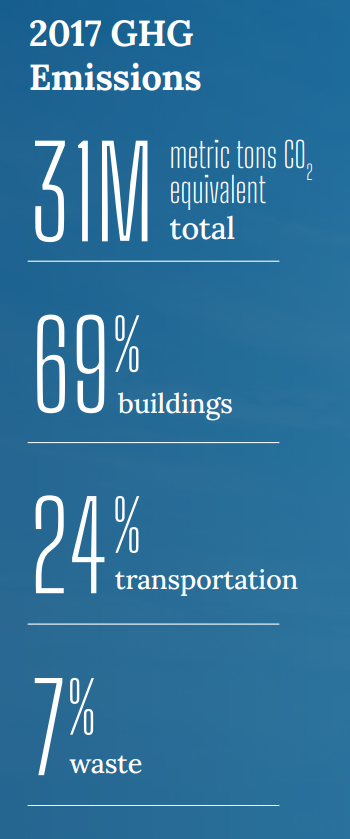Electrify Chicago
An independent tool for viewing City of Chicago building data
According to the
2022 Chicago Climate Action Plan,
69% of Chicago's emissions come from buildings, making
building emissions our biggest challenge and our biggest opportunity as a city
to tackle climate change. At Electrify Chicago, we showcase building performance using
publicly available data supplemented by community-submitted photographs and building
owners.
Start by looking at Chicago's buildings with the highest greenhouse gas intensity i.e. emissions per square foot. Large, efficient, buildings can perform much better than very inefficient small buildings on this metric.
New Article
📰 $30 Million In Missed Fines
The City Of Chicago failed to collect $30 million in potential fines from the building benchmarking ordinance, reducing transparency and accountability.
Legislative update! 🎉
As of late January 2024, legislation is being introduced to require new use more efficient forms of water and space heating, via the Clean And Affordable Buildings Ordinance (CABO), which will reduce the number of highly polluting and inefficient buildings that end up on this site.
If you're in Chicago,
write to your alderman to support the CABO!
Chicago Buildings by Greenhouse Gas Intensity
Note: Data includes large Chicago buildings with data from 2022, unless explicitly stated otherwise.
Note: This data only includes buildings whose emissions are reported
under the
Chicago Energy Benchmarking Ordinance. According to the City “As of 2016,
this list includes all commercial, institutional, and residential buildings larger than
50,000 square feet.” This dataset is also then filtered to only buildings with
reported emissions > 1,000 metric tons CO2 equivalent.
The latest year of data is from 2022, but we update the site regularly when new data is available, and some buildings may have failed to report that year, and only have older data available.
| Property Name / address | Primary Property Type |
Greenhouse Gas Intensity (kg CO2 eq./sqft) |
Total Greenhouse Emissions (metric tons CO2 eq.) |
|---|---|---|---|
|
560 W Fulton
560 W Fulton
| Multifamily Housing | 4.6 kg/sqft
Lowest 18%
| 291 tons
Lowest 8%
|
|
555 Cornelia Condominium Association
555 W Cornelia Ave
| Multifamily Housing | 4.6 kg/sqft
Lowest 18%
| 1,024 tons
Highest 44%
|
|
Central Standard Building
231 S LaSalle St
| Office | 4.6 kg/sqft
Lowest 18%
| 5,417 tons
Highest 6%
|
|
One Museum Park East Condominium Association
1211 S Prairie Ave
| Multifamily Housing | 4.6 kg/sqft
Lowest 18%
| 4,405 tons
Highest 8%
|
|
The ParkShore Condominium Association
195 N Harbor Dr
| Multifamily Housing | 4.6 kg/sqft
Lowest 18%
| 4,599 tons
Highest 8%
|
|
680 North Lake Shore Drive
680 N Lake Shore Dr
| Multifamily Housing | 4.6 kg/sqft
Lowest 18%
| 7,569 tons
Highest 4%
|
|
CityView Condominium Association
440 N McClurg Ct
| Multifamily Housing | 4.6 kg/sqft
Lowest 18%
| 2,308 tons
Highest 19%
|
|
340 West Superior Condominium Association
340 W Superior St
| Multifamily Housing | 4.6 kg/sqft
Lowest 18%
| 1,295 tons
Highest 37%
|
|
Park 1500 Lofts
📷
1500 W Monroe St
| Multifamily Housing | 4.6 kg/sqft
Lowest 18%
| 1,796 tons
Highest 26%
|
|
Opera Lofts
2545 S DEARBORN ST
| Multifamily Housing | 4.6 kg/sqft
Lowest 18%
| 759 tons
Lowest 44%
|
|
Catherine Courts Condominium Association of Chicago (5348-58 N. Cumberland Ave)
🕰️
5348-5358 N. Cumberland Ave
| Multifamily Housing | 4.6 kg/sqft | 476 tons |
|
1228 W MONROE
1228 W MONROE
| Multifamily Housing | 4.6 kg/sqft
Lowest 18%
| 237 tons
Lowest 4%
|
|
7121 7125 N PAULINA ST
🏆
7121 7125 N PAULINA ST
| Multifamily Housing | 4.6 kg/sqft
Lowest 18%
| 271 tons
Lowest 6%
|
|
1401 E HYDE PARK BLVD
1401 E HYDE PARK BLVD
| Multifamily Housing | 4.6 kg/sqft
Lowest 18%
| 258 tons
Lowest 5%
|
|
6942 North Wolcott
🕰️
6942 - 60 North Wolcott Avenue
| Multifamily Housing | 4.6 kg/sqft | 278 tons |
Data Source:
Chicago Energy Benchmarking Data
